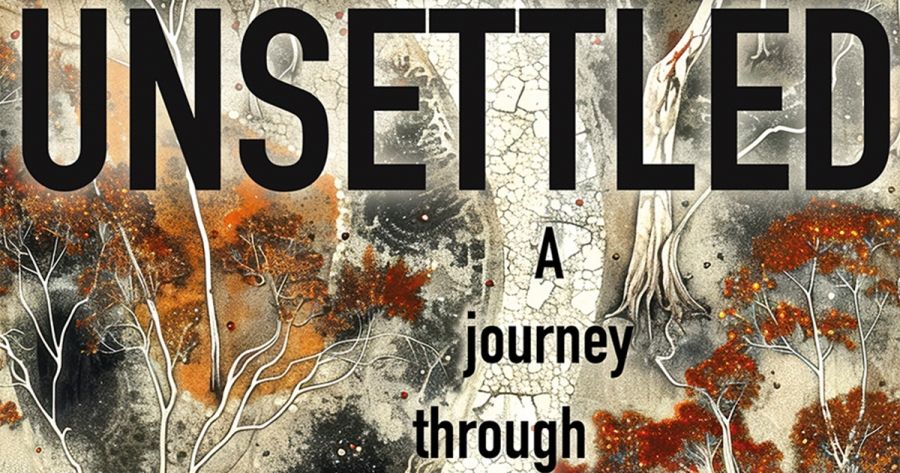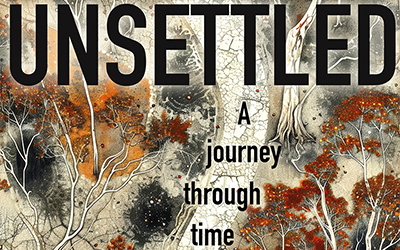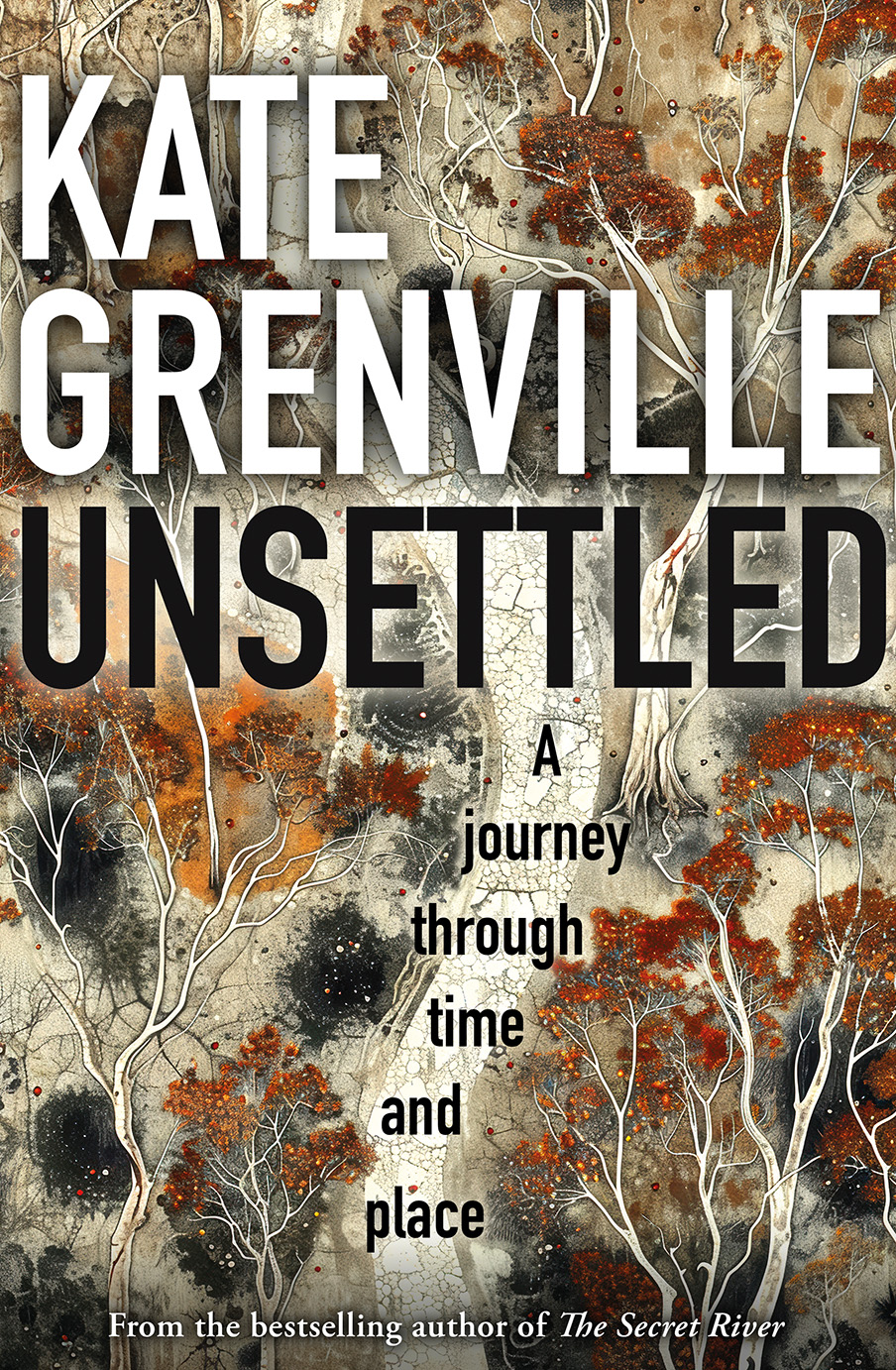
- Free Article: No
- Contents Category: History
- Review Article: Yes
- Article Title: History through speculation
- Article Subtitle: Open-minded musings from Kate Grenville
- Online Only: No
- Custom Highlight Text:
There has been, for some time, a debate among researchers of Australian history. Should the moral and psychological dimensions of settler experience be examined, or do we know enough already?
- Featured Image (400px * 250px):

- Alt Tag (Featured Image): Georgina Arnott reviews ‘Unsettled: A journey through time and place’ by Kate Grenville
- Book 1 Title: Unsettled
- Book 1 Subtitle: A journey through time and place
- Book 1 Biblio: Black Inc., $36.99 pb, 272 pp
- Book 1 Cover Small (400 x 600):

- Book 1 Cover (800 x 1200):

- Book 1 Readings Link: https://www.readings.com.au/product/9781760645649/unsettled--kate-grenville--2025--9781760645649#rac:jokjjzr6ly9m
Enter Kate Grenville, a novelist with history-debate form. Joan Makes History (1988) was her parodic account of Australian history from the perspective of Joan, a mythological stand-in for the everyday Australian woman. It was among several historical and cultural projects funded by the Australian Bicentenary Authority that contributed to a penetrating critique of the event they were supposedly celebrating, in part by compiling the history of the invasion so comprehensively.
The Secret River (2005) was Grenville’s fictionalised account of the ancestors she now pursues in the non-fictional Unsettled. It depicted a pair of convicts-turned-settlers developing good relations with Indigenous people before fear turns them hostile. Almost as soon as it was published, Grenville was criticised by historians for misrepresenting history. In a Quarterly Essay (2006), Inga Clendinnen drew on Grenville’s work to show how history and fiction could be confused but must not be.
Grenville countered that she was being misrepresented; that she hadn’t sought to be a historian but, rather, to represent the emotional quality of colonialism. Many a writers’ festival panel and literary magazine column was enlivened by the debate, which took place in the dying days of the Howard government and its refusal to say sorry to members of the Stolen Generations. In Searching for the Secret River (2006), Grenville suggested that her novel had forced ‘the opening of a new set of eyes in my head, a new set of ears’.
In Unsettled, Grenville has written a travelogue-come-family history which centres on the mind, specifically the mind of a settler-descended Australian trying to understand how her family was connected to the larger project of invasion, and how a mind retains the logic of that invasion. The ‘toxic legacy of colonialism’ is ‘our problem’. It requires people with settler ancestry to ‘do our soul-searching’.
In this way, Grenville’s knowing mind provides a commentary on her reflexive one; in a country pub, contemplating ‘Ye Olde things on the walls’, Grenville comes to see that the concept of ‘heritage’ might be one of these toxic legacies, but ‘the moment makes me listen to myself … what right do I have to be scornful? My being scornful is just one more way of denying that I’m part of all that hooey about pioneers.’ (Grenville italicises liberally, signposting a word’s unreliability.)
The tussle between a naïve self and a highly critical one is the central character drama of Unsettled, which takes place as Grenville follows the trail of her ancestors through rural New South Wales. It emerges early and holds fast, almost unchanged to the end. To borrow from Freud, as Grenville does, it echoes the eternal conflict between Ego and Super Ego that we all reckon with, but in a form which at times resembles a Punch and Judy show – riven, predictable, performative.
At work is the determined hand of the novelist, pushing revelation-as-narrative, pursuing moments of reckoning akin to ‘ground-dropping-away-from-under-my-feet shock’.
This arrives when Grenville discovers that the ancestor she thought was a modest publican was in fact the title holder of a station in New South Wales from 1832, putting him, for Grenville, in the category of ‘squatter’: ‘There’s no sound when something shifts in your sense of yourself. You don’t cry out. For a while there’s not even any feeling … there’s no fudging it. He was a squatter, all right.’ The moment’s drama has been prepared by an earlier reflection: ‘what sort of man was John Martin Davis? No idea. Nothing in my research gave any clue. But I’d always been glad that he was a publican’, not a ‘squatter’.
Grenville’s method is to get in situ – as historians Judith Brett, Mark McKenna, and, in an earlier generation, Keith Hancock have powerfully done – noticing details in the landscape and townscape that prompt new lines of enquiry. For Grenville, what she calls her ‘pilgrimage’ enables ‘space for open-minded musing’. This leads to a consideration of phrasing in historical markers and the etymology of town names: ‘I’ve read that Bucketty is the Darkinjung word for mountain springs … I’m wondering if something might have been lost in translation here – if bucketty is the word for mountain springs, it’s quite a coincidence, since a spring is where you do things with buckets. I find myself idly speculating ...’
Unsettled is history through speculation. Grenville takes seriously, as everyone must, the gaps in the colonial archive, and the necessity to read critically and with an eye to bias. But there are also truths that are verifiable – or close to being, which is not nothing – in sources including oral histories, anthropological studies of language and society, land records, correspondence, court reports, newspaper reports, as well as histories of colonies, nations, and regions – increasingly produced by Indigenous historians and bodies. It may or may not be possible to establish whether ‘Bucketty’ was a Darkinjung word, or a miscommunication, or a joke, but the onus is on Grenville to try to find out before speculating. Isn’t this essentially what we ask of our non-fiction writers?
Unsettled has no bibliography but does list twenty-one titles (without dates) in the Acknowledgments. Historians and their work are not cited, making some claims – such as what she terms Indigenous ‘independent farms’, of the nineteenth century – difficult to pursue, or learn about. Referring to one of the numerous stories of Indigenous cliff deaths, Grenville observes ‘Thea Astley wrote a famous novel about it’, without naming A Kindness Cup (1974), a novel which she introduced for Text Classics in 2018. On the value of historical research to this project, Grenville is ambivalent: ‘I’ve read books about frontier history but when it came to the land laws they seemed very complicated. Did I need to know all that detail? The big picture was clear enough: my lot just took it.’
That they took it is clear. But how that taking happened, the meat on the bones, is what makes the past real, tangible, compelling. Greg Dening provides a useful analogy: ‘the abiding grace of history [is that] it is the theatre in which we experience truth’. For stories to be consecrated as truth, our minds need details, footholds, a whole theatre in the mind.
Instead, Grenville takes us through uncertain mental terrain to explain her ancestors’ occupation of Indigenous lands, the modal verb doing the bush bashing. ‘Turns out it was a boiling-frogs sort of thing. First there was the squatting. Davis would have heard about the good land … Davis and McCarthy would have set off … They’d have got a hut up.’ The speculation follows, down the generations: ‘I’m guessing that Tom Maunder felt they were watching him, and he might have been right. The blacks, as he’d have called them. He’d have heard stories from the old hands. They’d have told him’. With every ‘would have’, I wondered.
This is an opportunity lost. While Grenville is suspicious of family history – which she connects with snobbery and cringeworthy shame around convict stain – there exists a tradition of well-researched accounts of pastoral families, led by Henrietta Drake-Brockman, Judith Wright, and Mary Durack, which reveals some of the ugly truths of invasion with a precision and human scale lacking here. David Marr’s Killing for Country (2023) is a recent exemplar – Marr noting that he could not believe how extensively violence, sabotage, and trickery were recorded by colonial journalists.
Reading the record, not just the mind, or even the landscape, would have enabled Grenville to better answer Lucashenko when she asked, ‘Who’s your mob?’


Comments powered by CComment